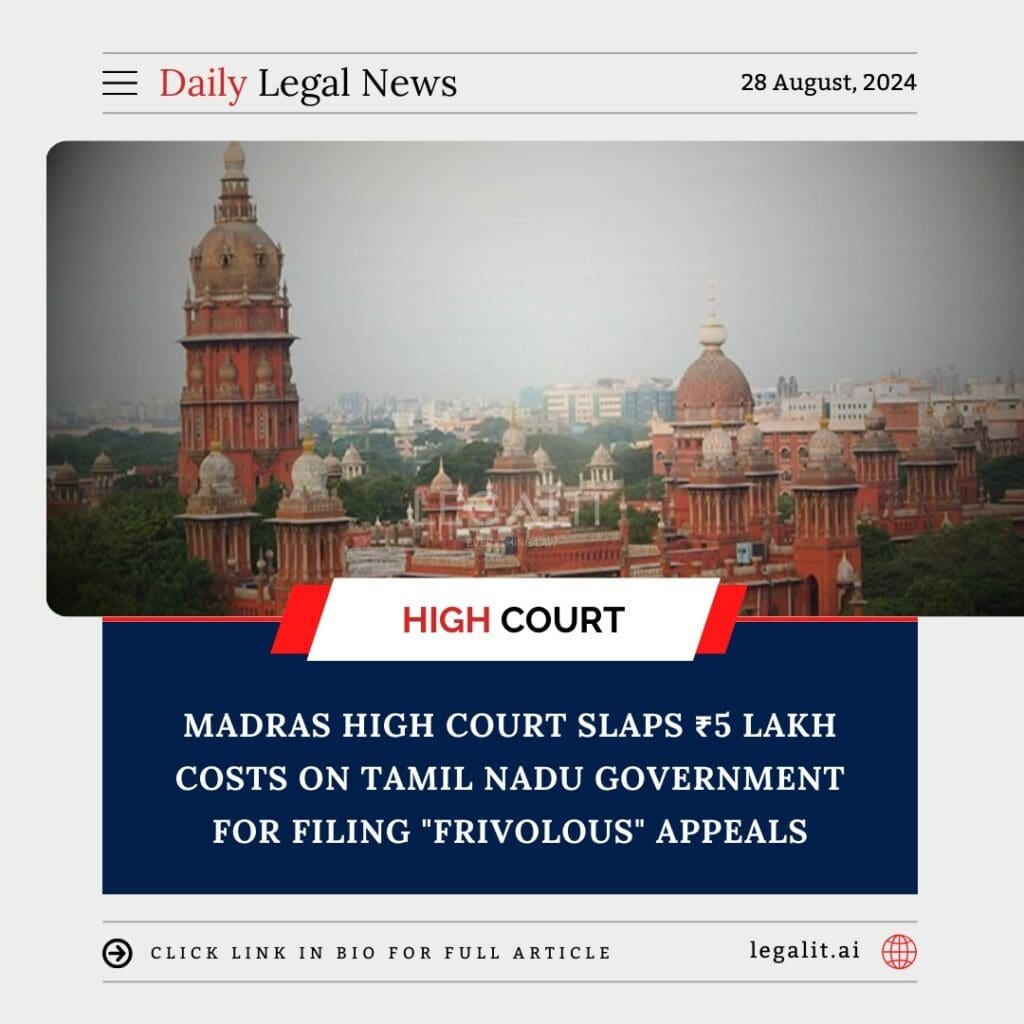
In a stern message to curb the misuse of judicial resources, the Madras High Court recently imposed a penalty of ₹5 lakh on the Tamil Nadu government for filing what the court deemed “frivolous” appeals. This ruling highlights the judiciary’s growing frustration with the overburdened legal system, which is often clogged by unnecessary litigation from various government bodies.
Context of the Case:
- Background of the Appeals: The Tamil Nadu government had filed multiple appeals in a case that the lower courts had already settled. These appeals were perceived by the court as unnecessary, with no substantial grounds or new arguments being presented. The High Court noted that the government’s persistence in pursuing the case was not only wasteful but also contributed to the backlog of cases that continue to plague the judicial system.
- Court’s Displeasure with Frivolous Litigation: The bench, led by a senior judge, expressed its displeasure with the state’s actions, categorically stating that such frivolous appeals are a misuse of the court’s time and resources. The judge emphasized that the courts are meant for the redressal of genuine grievances and should not be used as a tool for delaying justice or burdening the system with unmeritorious cases.
Key Points from the Ruling:
- Deterrent Against Misuse of Legal Process: The court’s decision to impose a hefty cost on the Tamil Nadu government serves as a deterrent against the misuse of the legal process. The High Court made it clear that it would not tolerate any attempt to abuse the judicial system by filing baseless or unnecessary appeals, especially by state bodies that ought to set a higher standard of conduct.
- Financial Penalty as a Warning: The ₹5 lakh penalty imposed by the court is significant, serving as a financial warning to the government. The court’s intention was to ensure that public funds are not squandered on futile legal battles and that state authorities exercise greater discretion and responsibility when deciding to pursue litigation.
- Implications for Government Litigation: This ruling could set a precedent for how courts across India handle frivolous litigation, particularly from government entities. The High Court’s decision may prompt state and central government bodies to rethink their approach to litigation, ensuring that only cases with merit and genuine legal issues are brought before the courts.
Wider Implications:
- Reducing the Judicial Backlog: By penalizing frivolous appeals, the High Court aims to reduce the backlog of cases that are currently overwhelming the judicial system. This move could encourage other courts to adopt similar measures, thereby streamlining the legal process and ensuring that courts are available to address more pressing and genuine matters.
- Encouraging Responsible Governance: The ruling sends a strong message to government agencies about the need for responsible governance. State bodies are expected to exercise greater prudence when using the legal system, recognizing that their actions have broader implications for the efficiency and integrity of the judiciary.
- Public Accountability: The imposition of costs on the government also reflects a growing trend toward public accountability. As custodians of public funds, government entities are expected to act in the public interest, which includes avoiding unnecessary expenditure on unwarranted legal proceedings. This ruling reinforces the idea that the government must be accountable for its actions in court, just as any other litigant would be.
Conclusion:
The Madras High Court’s decision to impose ₹5 lakh in costs on the Tamil Nadu government for filing frivolous appeals is a significant step in curbing the misuse of the judicial system. By taking a firm stand against baseless litigation, the court has sent a clear message that the legal process should not be abused and that government entities must act responsibly and judiciously when engaging in legal battles.
This ruling is not just a warning to the Tamil Nadu government but to all public bodies across India, emphasizing the need for accountability and the responsible use of legal resources. As the judiciary continues to grapple with a massive backlog of cases, such measures are crucial in ensuring that the courts can function effectively and serve the needs of those with genuine grievances.